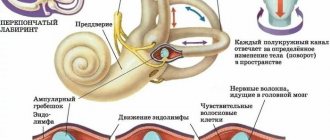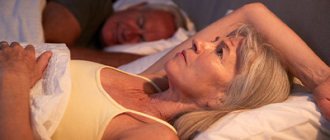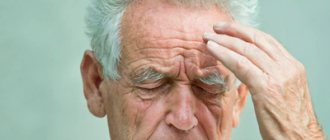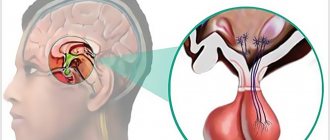“The young come and go, but the old remain”
(V. Konyakhin)
Older people often complain of sleep problems. Thus, according to a number of studies, up to 48% of people over 65 years of age experience various sleep disorders. With aging, the total duration of sleep decreases, the duration of the superficial stages of sleep increases, as well as the time of falling asleep and being awake within sleep. As a result, older adults take longer to fall asleep and reach the restful stage of deep sleep. With such a sleep structure, there may be complaints like “I didn’t sleep a wink all night.” If such people are accidentally awakened, they may not fall asleep for a long time. An age-related increase in time spent awake during the night and a deterioration in the quality of nighttime sleep, respectively, cause daytime sleepiness and the need for sleep during the day.
Rice. The Grieving Old Man (Van Gogh)
One hypothesis for sleep disturbances in old age is that circadian rhythm is disrupted and nocturnal melatonin secretion decreases during the aging process. The shift in the rhythm of melatonin secretion may be influenced by a decrease in the time spent by older people in conditions of natural lighting with intense light flow and age-related opacification of the lens (cataract).
In addition to physiological reasons for changes in sleep structure in older people, insomnia can be a consequence of somatic (heart failure, etc.), neurological (back pain, etc.) or mental illnesses (depression, dementia).
Quite often, the cause of insomnia in old age is depression, the frequency of which increases on average by 1.2-1.4 times every 10 years. Depressive disorders are most often caused by changes in the patient’s social status. Thus, in particular, upon retirement, the “disciplining” role of productive activity is lost, which leads to pervasive feelings of hopelessness, depression and uselessness. In turn, these feelings prevent you from falling asleep. Sleep disturbances in depression reach 100% of cases. People with depression sleep less, take longer to fall asleep, and wake up more often for longer periods during the night.
This phenomenon is very illustrative of the works of the famous American artist William Utermohlen, who suffered from depression. For a long time, the artist was troubled by insomnia, which was reflected in his works.
Rice. Bed (William Utermohlen)
However, long-term depression in older people can cause further development of dementia (dementia) with the characteristic feature of sleep disorders. A similar fate befell William Utermohlen. So, 10 years after the onset of insomnia, the artist began to lose his memory. After being examined by a neurologist, he was diagnosed with dementia. This tragic period in the artist’s life was reflected in a series of self-portraits painted at intervals of one year.
Rice. Series of self-portraits (William Utermohlen)
In dementia, sleep disorders are caused by a disturbance in the circadian rhythm in the form of inversion (“rearrangement”) of sleep with wakefulness at night and drowsiness during the day. As a rule, these conditions are accompanied at night by disorientation, restless behavior, fussiness, “getting ready for the road,” tying knots from bed linen, taking things out of closets, etc. that is, manifestations of behavioral disorders characteristic of late-life dementia.
Other causes of sleep disturbance in old age include conditions such as obstructive sleep apnea and restless legs syndrome. Obstructive sleep apnea syndrome in people over 65 years of age reaches 60%. Its development occurs when the soft tissues in the back of the larynx collapse and the airways are completely blocked. In severe forms of the disease, up to 400-500 respiratory arrests may occur per night for a total duration of up to 3-4 hours. The most common symptom of obstructive sleep apnea is snoring (which occurs in almost 100% of cases). Frequent episodes of breath-holding with stimulation disrupt the flow of sleep and lead to an almost complete absence of deep stages of sleep. As a result, elderly patients do not receive the refreshing effect of sleep and experience daytime sleepiness (in 70-90% of cases). Attacks of drowsiness can become permanent, with falling asleep in transport, while eating, etc. At one time, Charles Dickens described a typical portrait of such a patient in the novel “Posthumous Papers of the Pickwick Club”: “... he was a fat man with a short neck and a red face, who constantly fell asleep and began to snore in the most inconvenient situations.”
Restless legs syndrome is a condition characterized by “unpleasant” sensations in the legs that disappear completely or partially only when moving. Approximately 15% of older people complain of discomfort that prevents them from resting. There is practically no pain, but the discomfort is so unpleasant (tingling, severe itching, a feeling of “pins and needles”, etc.) that it is impossible to lie or sit. You have to get up and move around, bend and straighten your limbs to eliminate the discomfort. For most patients, the most problematic moment is when they go to bed. A distinctive feature of the disease is an exacerbation of symptoms from midnight to 4 am. Movement disorders provoke night waking. Restless legs syndrome is depicted very figuratively in the painting by Anna Slivkova.
Rice. Insomnia (Anna Slivkova)
Iatrogenic insomnia in older people deserves special attention. Quite often, elderly patients are prescribed medications whose side effect is sleep disturbance. Therefore, it is always important to discuss prescribed medications with your doctor.
In order to assess the quality of your sleep, we suggest that you independently fill out the Modified Score Scale of Subjective Sleep Characteristics (Ya.I. Levin, modified by T.B. Merkulova, E.I. Rasskazova) and calculate the result.
Symptoms of insomnia
- Daily difficulty falling asleep;
- Poor sleep;
- Frequent awakenings;
- Early awakenings;
- Frequent disturbing dreams;
- Feeling anxious or restless when waking up;
- Difficulty falling back asleep;
- Lack of feeling of rest after sleep;
- Reduced sleep duration;
- Increased sensitivity and pain to any, even minor, irritants.
Elderly patients with insomnia experience anxiety, awaken mainly in the first hours of sleep and cannot adequately assess its duration.
Sleep disorders and dementia
In senile dementia and other delirious disorders, severe insomnia develops. Elderly people themselves do not complain about it, but for nearby relatives such sleep disturbances become a serious problem. A person does not fall asleep himself, does not allow others to sleep, his sleep and wakefulness patterns change. Therapy in this case requires a special approach.
In dementia, problems with sleep manifest themselves as a violation of the daily routine: during the day a person experiences drowsiness, and closer to night anxiety and agitation increase. The patient may try to leave home, collect things, tie knots, experience hallucinations, etc. It is dangerous to use tranquilizers in this condition: they can worsen health and make the patient even more restless.
It is possible to use antipsychotics and correct previously prescribed drug therapy. Medical doctors recommend changing your regimen so that the bulk of your activity occurs during the daytime hours. This will help restore the circadian rhythm, control it, and reduce the frequency of insomnia episodes.
Order a visit from a gerontologist. Experienced doctors. Treatment in a hospital or at home. 24-hour service in Moscow and the region. Professional, anonymous, safe.
- Caring for the elderly with mental disorders
- Psychiatrist help at home
- Types of rehabilitation for the elderly and disabled
- Advantages of our hospital
- How to choose a good nursing home
- Care for the elderly: in a hospital or at home
- Problems of caring for the elderly
- Who should you leave a person with dementia with if you need to leave?
- Help from a gerontologist in caring for an elderly person
- Sleep disorders in older people
- Features of caring for a bedridden patient
- Features of caring for older people with mental disorders
- Hygiene in old age
- Establishing guardianship for a patient with dementia
- Rules for communicating with an elderly person
- 10 Frequently Asked Questions About Nursing Homes: Everything You Need to Know
Causes of insomnia
Researchers have found that a person who sleeps less than 7 hours a day has a risk of developing diabetes, and is also at risk of heart attack and stroke. In this regard, it is important to establish the causes of insomnia, which may include:
Bad habits
- Violation of sleep schedule;
- Drinking alcohol at night;
- Loud environment or bright light in the room;
Diseases
- Alzheimer's disease;
- Night heartburn;
- Frequent urge to urinate;
- Diabetes;
- Arthritis;
- Arthrosis;
- Osteoporosis;
- Asthma;
- Night heartburn;
- Diseases of the cardiovascular system;
- Sleep apnea;
- Nervous system lesions;
Mental disorders
- Depression (endogenous, neurotic or vascular origin);
Menopause and postmenopause
Insomnia is accompanied by hot flashes and increased sweating not only during the day, but also at night, which prevents restful sleep;
Medicines used in therapy:
- Psychotropic drugs (antidepressant tablets, psychostimulants, nootropics);
- Antihypertensive drugs (clonidine, b-blockers);
- Drugs against cardiac arrhythmia;
- Bronchodilators (ipratropium bromide, terbutaline, salbutamol, theophylline drugs);
- Hormonal drugs (glucocorticoids, thyroid hormones, progesterone);
- Some types of antibiotics (quinolones);
- Lipid-lowering drugs (statins, fibrates, cholestyramine);
- Drugs for the treatment of Parkenson's disease (levodopa, selegiline);
- Overdose of cardiac glycosides;
- Medicines for tumors;
- Cough preparations;
- Eye drops containing b-blockers;
- Nasal drops containing sympathomimetics;
- Diuretics;
- Medicines to reduce the manifestations of diabetes mellitus;
Low physical activity
Lack of physical activity can be accompanied by disturbances in sleep-wake cycles. You may also experience difficulty falling asleep or an excessive need to sleep. Regular aerobic exercise will help get rid of these problems.
Unfavorable life situation
Tragic events (such as the death of a loved one) can lead to chronic stress, anxiety, worry and depression.
Loneliness
With age, most people take an inactive social position, which is associated with the cessation of social activities and retirement. The level of communication and the quality of brain function decrease, which prevents the timely onset of sleep. In this situation, experts recommend finding a hobby.
Insufficient sunlight during the day
Sunlight promotes the production of melatonin, which helps regulate the sleep-wake cycle in the body. Elderly people need to receive sunlight at least 2 hours a day. To do this, do not tightly close the windows with curtains during the daytime.
Sleep disorders in the elderly and senile. Clinical treatment guidelines
P
The problem of sleep disturbances in the elderly has remained neglected for a long time, despite increased complaints of poor sleep and increased consumption of sleeping pills. According to a number of epidemiological studies of the population of older age groups (65 years and older), up to 35% of elderly and elderly people have sleep-related problems. Dissatisfaction with sleep is noted in 25% of older men and 50% of older women. More than 25% of elderly patients regularly or often use sleeping pills. Sleep disturbance is one of the factors in assessing the quality of life of the elderly.
The main manifestations of sleep disorders in the elderly:
– persistent complaints of insomnia;
– constant difficulty falling asleep;
– superficial and intermittent sleep;
– the presence of vivid, multiple dreams, often with painful content;
– early awakenings;
– feeling of anxious restlessness upon awakening;
– difficulty or inability to fall asleep again;
– lack of feeling of rest from sleep.
Elderly patients with dissomnia disorders wake up more often in the first hours of sleep, are more anxious, and tend to exaggerate the duration of the period of falling asleep and underestimate the duration of sleep.
The main causes of sleep disorders in the elderly and elderly
In later life, the multifactorial nature of sleep disorders, the interaction of psychosocial, medical and psychogenic factors in combination with organic brain dysfunction, is most often recognized. However, the modern taxonomy of sleep disorders provides for their division into primary and secondary.
To primary sleep disorders in the elderly
include nocturnal myoclonus, restless legs at night, and sleep apnea (holding your breath during sleep and then waking up). It should be noted that sleep apnea is generally more common in later life or becomes more frequent with age. This is usually preceded by a long period of snoring during sleep, and then apnea joins. It is well known that this syndrome is observed mainly in obese men in the second half of life, but it often occurs in women in old age.
Secondary sleep disorders
caused by somatic diseases, neurological lesions, mental disorders, in which dyssomnia is a symptom of these diseases. Most often this is a cardiovascular pathology (hypertension, coronary heart disease), when nocturnal arterial hypertension and nocturnal angina attacks occur. Sleep disturbances often occur in patients with heart failure due to inadequate treatment for this condition, and correction of the therapeutic tactics of heart failure also makes it possible to regulate sleep disturbances. Sleep disturbances can be caused by an increase in nighttime attacks of bronchial asthma or exacerbations of chronic obstructive pulmonary disease, various pain syndromes, and in old age, most often due to polyosteoarthrosis. Sleep disturbances can be a symptom of endocrine pathology (thyrotoxicosis, diabetes mellitus). Intermittent sleep is caused by nocturia in patients with benign prostatic hyperplasia. Restless legs syndrome, accompanied by difficulty falling asleep, can also be secondary (B12 deficiency anemia, chronic renal failure, diabetic polyneuropathy, etc.). Prior to falling asleep, painful sensations in the legs and feet force patients to move their legs or walk, resume when they go to bed and disappear only in a sufficiently deep sleep. Sleep disorders associated with somatic pathology are most characterized by shallow sleep and frequent awakenings, rather than difficulty falling asleep. In these situations, adequate treatment of the underlying disease is of paramount importance, and the use of drugs with a hypnotic effect is justified only if the measures taken are unsuccessful and taking into account strict contraindications to the prescription of psychotropic drugs.
In neurological practice, sleep disorders have been studied in detail in organic lesions of the central nervous system, involving structures that ensure the initiation and maintenance of sleep, lesions of the peripheral nervous system (in vertebrogenic diseases, polyneuropathies, etc.), as well as in neurogenic asthenic conditions.
Among all secondary sleep disorders in late age, two thirds are due to mental disorders and diseases
. Most often, sleep disorders are a symptom of depressive states of various origins, both endogenous and neurotic, vascular. Moreover, even shallow depressions (mild and moderate severity) are usually accompanied by dissomnia. Depression is observed, in which sleep disorder is the leading one and determines the clinical picture of the condition, while depressive symptoms themselves are revealed only with careful questioning. Minor depression is especially common in somatic practice, but is not always diagnosed, often due to the masking of depressive disorders by somatic complaints and symptoms or other manifestations of atypia.
Depressed patients with sleep disorders often complain of insomnia. When questioned, both difficulties in falling asleep and characteristic early awakenings with the inability to fall asleep again, anxious restlessness when awakening at night, and a painful state of mind in the early morning hours are revealed. Depressive patients are characterized by a lack of sleep; they often develop an obsessive fear of nightfall and insomnia.
Among psychiatric situations with sleep disturbances, there may be conditions when patients do not complain, but there are severe sleep disturbances (states of excitation in psychosis, manic or hypomanic states, delirious disorders of toxic and vascular origin), as well as in late-life dementia. In the latter case, sleep inversion with fussy wakefulness at night and daytime drowsiness is often observed. This clinical situation is especially difficult both in a hospital setting and when caring for dementia patients at home.
In geriatric practice, it is especially important to consider the possibility of iatrogenic insomnia
. According to a direct pharmacological mechanism, sleep disturbances can be caused by the following drugs:
– psychotropic drugs (antidepressants, psychostimulants, nootropics);
– antihypertensive drugs (clonidine, b-blockers);
– antiarrhythmic drugs;
– bronchodilators (ipratropium bromide, terbutaline, salbutamol, theophylline drugs);
– hormonal drugs (glucocorticoids, thyroid hormones, progesterone);
– some antibiotics (quinolones);
– lipid-lowering drugs (statins, fibrates, cholestyramine);
– antiparkinsonian drugs (levodopa, selegiline);
– cardiac glycosides (in case of overdose);
– antitumor drugs;
- antitussives.
Sleep disturbances can be caused by eye drops containing b-blockers and nasal drops containing sympathomimetics. Due to an indirect pharmacological mechanism, sleep disturbances may occur when taking diuretics (including due to fear of incontinence), antidiabetic drugs (polyuria, hypoglycemia, etc.).
Identification of the main cause of insomnia, as well as clarification of the characteristics of sleep disturbance according to the main parameters (time of falling asleep, duration of sleep, night awakenings, the presence and nature of dreams, assessment of the quality of sleep and quality of awakening) is necessary not only for diagnostic purposes, but also important for the choice of methods and means of therapy.
Basic principles of management of elderly patients with insomnia:
– Identification of the cause of insomnia with possible correction;
– patient education, recommendations for optimizing the process of falling asleep;
– drug therapy.
The first task of the doctor is the differential diagnosis of sleep disorders in elderly and senile patients, clarification of the main manifestations of dyssomnia, and only after that the adoption of therapeutic intervention measures.
Patient education
suffering from insomnia, comes down to the following recommendations:
– the need to go to bed only when the need for sleep occurs;
– moving from the bedroom to another room for reading if it is impossible to fall asleep after 15–20 minutes in bed and returning to the bedroom when the need to sleep reappears. The purpose of such a maneuver is to associate the bedroom with sleep, and not with insomnia;
– getting out of bed in the morning at the same time, regardless of the duration of sleep the previous night;
– avoiding sleep during the day or reducing it to a minimum (no more than 30 minutes when you need to sleep);
– limiting your stay in bed only during sleep;
– going to bed at the same time, avoiding excessive impressions in the evening, overeating, tonic drinks, etc.
Basic principles of drug therapy for insomnia:
– Availability of indications for drug therapy for insomnia;
– prescription of low effective doses;
– selection of a drug with optimal pharmacokinetic properties;
– intermittent therapy (2–3 times a week);
– short-term use of medications (3–4 weeks);
– gradual withdrawal of hypnotics;
– monitoring patients during treatment and after stopping the hypnotic.
Only conditions with long-standing sleep disorders are subject to drug treatment. Transient episodes of dyssomnia do not require medication, nor do physiological changes in sleep patterns in the elderly.
Primary sleep disorders require a differentiated approach to treatment. While tranquilizers may be helpful for myoclonus, these drugs are not indicated for sleep apnea because they can worsen breathing problems. Some effect is achieved by prescribing cyclopyrolones (zopiclone, zolpidem).
The basic principles of therapeutic correction of secondary sleep disorders come down to active and adequate treatment of the underlying disease (somatic, neurological mental) the symptom of which is sleep disturbance, correction of drug therapy for iatrogenic dissomnias.
If previously combination therapy with antidepressants and tranquilizers, including hypnotics, was traditionally used for the treatment of depressive disorders, now the latest antidepressants (mirtazapine, mianserin) have been introduced into practice, which have sleep-improving properties and do not require additional prescription of tranquilizers-hypnotics.
In cases of iatrogenic dyssomnia, it is naturally necessary to reconsider the doses of drugs used that are potentially responsible for sleep disturbance; It is useful to maneuver the medication regimen during the day, etc., that is, it is advisable to do everything possible to avoid additional prescriptions of psychotropic drugs.
When prescribing tranquilizers to the elderly, including those with a hypnotic effect, the doses of the drugs should be reduced by half in comparison with those used in young and middle age, and courses of therapy should not exceed the required duration, be interrupted in a timely manner when the effect is achieved, or be replaced by taking medications intermittently. mode.
Choosing a drug for the treatment of sleep disorders
For the drug treatment of sleep disorders in elderly and senile patients, the use of first-generation hypnotics (i.e., barbiturates) is currently avoided due to the high risk of respiratory depression during sleep.
The most widely used in the treatment of secondary sleep disorders are benzodiazepine derivatives or second-generation hypnotics.
. When prescribing them, one should proceed from the prevailing characteristics of sleep disorders and information about the pharmacokinetic properties of the drugs, primarily about their half-life from the body. Depending on this, drugs are divided into three groups:
– short-acting drugs (up to 6 hours);
– drugs with an average duration of action (up to 12 hours);
– long-acting drugs (more than 12 hours).
Short-acting drugs (midazolam, triazolam, flurazepam) are prescribed for severe difficulties falling asleep. To facilitate falling asleep, non-hypnotic tranquilizers (oxazepam, tofisopam, temazepam, diazepam) are often used, which relieve feelings of internal tension and mild anxiety, thereby making it easier to fall asleep due to the sedative effect. Without leaving drowsiness, they can still cause daytime muscle relaxation.
Medium-acting benzodiazepine hypnotics (bromodihydrochlorophenyl benzodiazepine, temazepam) are indicated to improve falling asleep, achieve greater depth of sleep, and eliminate frequent night awakenings. Trace reactions after taking them are often in the form of morning drowsiness and muscle relaxation.
Benzodiazepine drugs with a long half-life are used in patients with difficulty falling asleep, shallow sleep and early awakenings. These drugs significantly improve sleep characteristics, but are most likely to leave trace drowsiness during the day, thereby increasing the risk of adverse effects with long-term use.
In geriatric practice, when prescribing benzodiazepine drugs to patients with sleep disorders, one has to maneuver between the effectiveness of longer-acting drugs with the risk of their accumulation in the aging body and safer drugs with a short half-life, but with a significantly higher incidence of sleep disorders when they are discontinued. Tactically, therapeutic techniques also include changing medications, intermittent use, and dosage reduction.
Benzodiazepine drug interactions
Taking into account forced polypharmacy in elderly patients with multiple somatic pathologies, the problem of drug interactions inevitably arises, in particular, the interaction of benzodiazepine drugs with other drugs when they are prescribed in combination to the elderly and elderly:
– increased hypotensive effect of clonidine, ACE inhibitors;
– risk of increased blood pressure with simultaneous administration of theophylline drugs;
– inhibitory effect on the central nervous system when combined with b-blockers;
– an increase in the concentration of a tranquilizer (midazolam) in the serum when used in combination with calcium channel blockers;
– increase in the concentration of cardiac glycosides in the serum;
– when combined with cimetidine, omeprazole, the concentration of benzodiazepines in the serum increases;
– when taking anticoagulants (warfarin), an increase in prothrombin time is sometimes observed;
– increased hypoglycemic effect when used simultaneously with antidiabetic drugs;
– macrolides slow down the metabolism of alprazolam; on the contrary, rifampicin, according to some data, has the ability to accelerate the metabolism of diazepam. Isoniazid inhibits the metabolism of diazepam.
Side effects of benzodiazepines
As for the problem of side effects of treating sleep disorders with benzodiazepine derivatives, such as muscle relaxation and trace drowsiness are well known to doctors (usually the main contraindication is not overlooked - the diagnosis of myasthenia gravis or myasthenic syndrome). Experience shows that the appearance of undesirable effects forces patients themselves with intact criticism to refuse to take medications, reduce the dose, reduce intake, or resort to alternative methods of treating sleep disorders. General practitioners usually have less awareness of the moderate inhibitory effect on the respiratory center, especially in chronic obstructive pulmonary disease, and the possibility of constipation when taking clonazepam, bromodihydrochlorophenyl benzodiazepine. One should also keep in mind the possibility of a decrease in myocardial contractile function and mild arterial hypotension.
Undesirable consequences of the use of tranquilizers-hypnotics in elderly and senile patients:
– excessive sedation;
– muscle relaxation;
– balance problems, falls;
– disorders of concentration;
– worsening dysmnestic disorders.
In general, the use of benzodiazepines for sleep disorders in the elderly is quite safe, and this is well known to practicing physicians.
Drug addiction
A natural concern for both doctors and patients themselves is the problem of drug addiction. Without ignoring this problem, it should be recognized that in its pronounced clinical manifestations, that is, with the development of mental and physical dependence, signs of increased tolerance, the need to increase the dose and severe manifestations of withdrawal syndrome, this is observed extremely rarely in the elderly. The risk of addiction increases if you have a history of alcohol addiction or persist into old age. Usually we are talking about concerns associated with long-term or constant use of the same dose once before bedtime. Clinical observations show that in relation to these cases it is not entirely legitimate to use the concept of substance abuse. Guided by the principles of course treatment of limited duration, in some cases long-term use of drugs can be considered quite safe in order to improve the quality of life of elderly patients.
New generation hypnotists
In recent years, the possibilities for effective and safe treatment of sleep disorders in elderly and senile patients have expanded significantly due to the development and introduction into practice of third-generation hypnotics, which include cyclopyrrolone derivatives (zopiclone, zolpidem). These drugs show significant advantages both in the manifestations of the hypnotic effect and in the almost complete absence of negative consequences of therapy, as well as in the characteristics of use. Due to the higher selectivity of the effect on benzodiazepine receptors, drugs in this group provide sleep that is closest to physiological. The hypnotic effect occurs quickly due to the rapid absorption of the drugs, and therefore it is recommended to take the medications before bedtime, while already lying in bed. The short half-life of hypnotics of this series makes them indicated primarily for sleep disorders. On the other hand, these pharmacokinetic features prevent the accumulation of the active agent and its metabolites in the body of elderly patients, which has a positive effect on tolerability and the absence of aftereffects of the sleeping pill the next day. The only often observed undesirable effect is found in complaints of bitterness in the mouth, which dictates the need to reduce the dose from 1 tablet (7.5 mg) to 1/2 tablet. A special study of the dynamics of the state of cognitive functions did not reveal signs of their deterioration (according to the MMSE scale) during the month-long course of treatment. When a therapeutic effect is achieved, there are no significant problems with the end of therapy. Currently, drugs in this group (zopiclone, zolpidem) are considered as first-choice drugs for the treatment of sleep disorders of various origins in geriatric patients.
The effect of tranquilizers on the cognitive functions of the elderly
In geriatric practice, another question arises, namely, the impact of taking tranquilizers, including those with a hypnotic effect, on the cognitive functions of aging patients. It is known that these drugs can reduce concentration and, according to some data, affect mental abilities, weakening them. The risk of developing cognitive decline is more relevant with long-term use of tranquilizers repeated throughout the day and, as experience shows, is unlikely to be seriously justified when taking minimal doses of these drugs before bed. However, if there are signs of cognitive decline with concentration disorders and mnestic disorders, the prescription of tranquilizers, even just for the purpose of establishing sleep, should be strictly limited both in time and in the dose used, especially since in the elderly and elderly with dementing diseases and sleep disorders this is not brings the desired effect.
Quite often it is practiced to prescribe amitriptyline to elderly patients with complaints of insomnia, taking into account the side effect of this drug in the form of drowsiness, as well as its anti-anxiety properties. However, as practice shows, contraindications to taking amitriptyline are rarely taken into account (glaucoma, benign prostatic hyperplasia, cardiac pathology with rhythm disturbances) and the anticholinergic effect is not taken into account at all with long-term use with the risk of worsening cognitive disorders in the elderly and elderly with disabilities memory.
Sleep disorders in patients with dementia
Special therapeutic approaches require sleep disturbances in patients with dementia of late age (Alzheimer's type, vascular, combined vascular atrophy), as well as sleep disturbances in the clinic of delirious disorders, most often of vascular origin. In these cases, dementia patients almost never themselves complain of insomnia. Patients with cerebrovascular pathology often report unusually vivid dreams of painful or fantastic content. It should be borne in mind that these manifestations may be a prodrome of vascular delirium, and timely adjustment of drug therapy can prevent the development of confusion.
In dementia patients, sleep disorders are caused by disruption of the circadian rhythm in the form of sleep inversion with wakefulness at night and drowsiness during the day
. As a rule, these conditions are accompanied by disorientation, restless behavior, fussiness, “getting ready for the road,” tying knots from bed linen, taking things out of closets, etc. that is, manifestations of behavioral disorders characteristic of late-life dementia. In delirious states of vascular origin, mental disturbances increase in the evening, confusion occurs or intensifies at night, patients do not sleep, are motorically excited, and often experience deceptions of perception (illusions, hallucinations). These conditions with severe sleep disturbances make it extremely difficult to manage patients in a hospital (as well as care at home) and often cause stress-related disorders in relatives of dementia patients and staff of care units. The use of tranquilizer-hypnotics and third-generation hypnotics is usually ineffective in patients with dementia or confusion. Moreover, the paradoxical effect of increased arousal when using them is well known. In these cases, treatment with small doses of neuroleptics is most justified. The best effect and safety of use is ensured when prescribing modern drugs from the group of atypical antipsychotics (risperidone 0.5–1 mg, quetiapine 25–100 mg, olanzapine 2.5–5 mg). If it is not possible to purchase them, haloperidol in drops (up to 5–10 drops), periciazine in drops (3–5 drops), thioridazine 25–50 mg before bedtime is used with sufficient effect. However, these prescriptions are only a temporary addition to the main neurotransmitter or vasoactive therapy.
Types of senile insomnia
You need to know that insomnia is not a normal condition. Sleep disorders can manifest themselves in various forms and have certain symptoms. Experts identify the following types of insomnia:
Insomnia
With this type of sleep disorder, a person cannot fall asleep. Even if sleep occurs, its duration is extremely short. In most cases, patients with this type of insomnia are in a stressful state. The problem can be eliminated by stabilizing a person’s emotional background. A psychotherapist treats insomnia.
Hypersomnia
This type of disorder is characterized by an increased need for sleep (from 12 to 20 hours). However, even with such a long rest, older people may not feel invigorated. Most often, hypersomnia affects people who regularly do not get enough sleep and are constantly under stress. This pathology occurs:
- Idiopathic;
- Post-traumatic;
- Narcoleptic.
Parasomnia
It is characterized by a sleep phase disorder in which an elderly person may wake up and fall asleep repeatedly during the night. Often the causes of parasomnia are diseases such as enuresis, sleepwalking, nocturnal attacks of epilepsy or bronchial asthma, as well as a state of fear.
In addition, insomnia can be both short-term and chronic.
Why do sleep problems develop?
A wide range of diseases can trigger the development of sleep problems, such as arthritis, prostatitis, heart disease, and pain of various origins. Sleep disturbances are often caused by depression, anxiety disorder, dementia, various psychoses, especially delirium, and taking medications, such as psychotropic drugs.
There are many reasons for insomnia in an elderly person, the list goes on, but with timely and proper treatment, sleep quickly returns to normal.
“Older people often experience a number of psychological and social problems, often suffer from loneliness, experience the pain of losing a loved one, are limited in physical activity, and do not follow a sleep schedule for various reasons. All this leads to the frequent transition of insomnia to a chronic form. According to research, insomnia is chronic in more than 50% of cases. This course of the disease is more difficult to treat and requires an integrated approach,” says Ruslan Isaev.
They complain of insomnia. Somnologist on how to restore routine after COVID Read more
Who should I turn to for help?
The Ultramed Gerontology Clinic treats elderly people with various diseases. A psychotherapist treats insomnia in a medical setting. However, depending on the causes of the disease, intervention by other experts is possible.
In many cases, patients undergo an initial examination, which is carried out by a general practitioner, who then refers the client to the right specialist. The help of a psychologist is often effective.
If you need surgical treatment for insomnia, then we are ready to provide you with all the necessary help from highly qualified specialists with more than 20 years of experience.
Diagnosis of insomnia
One of the most famous and popular methods for diagnosing insomnia is the Epworth scale. This scale was created to assess sleepiness on a scale from 0 to 4.
A person who has problems with sleep is asked to answer the questions of the technique based on the patient’s answers - the corresponding score can be calculated. Of course, diagnosing insomnia with just one scale is not enough. Before confirming this diagnosis, the patient is prescribed a detailed examination, after which, based on the results obtained, the doctor prescribes treatment.
insomnia treatment
Methods for treating insomnia in older people
Medications
Medicines for insomnia can be prescribed only after an accurate determination of the causes of the pathology.
Second and third generation hypnotists
According to the duration of action, they are divided into 3 groups:
- Medicines that have a short period of action (lasting up to 6 hours). This group of remedies helps eliminate anxiety and simplifies the process of falling asleep.
- Medications with an average period of action (up to 12 hours). Taking such medications helps you fall into deep sleep and solve the problem of frequent awakenings at night.
- Long-acting medications (more than 12 hours).
These drugs are the best way to improve sleep in older people, but they have side effects such as drowsiness that does not go away even after waking up.
It is important to remember that second and third generation hypnotics should not be taken for a long period of time.
Antidepressants
Prescribed in cases where the cause of sleep disturbances is a depressive state.
Neuroleptics
Effective in identifying dementia or mental disorders that accompany insomnia.
Sleeping pills
Hypnotics can be additionally used in addition to the main therapy. You should take exclusively sleeping pills only if basic therapy has not given a positive result.
Sleeping pills should be taken with caution, as this group of medications has many side effects:
- Habituation;
- Short term exposure;
- Deterioration in general health;
- Relaxing effect on muscles, leading to falls and injuries.
We recommend resorting to the use of medications in extreme cases, only after using alternative methods of therapy.
Prescription drugs
- Andante;
- Zolpiderm (Sanval);
- Zopiclone (Imovan).
Drugs available without a doctor's prescription
- Corvalol;
- Valocordin;
- Tanakan;
- Donormil;
- Melatonin.
It must be remembered that medications sold in pharmacies without a prescription have their own contraindications and adverse reactions. For this reason, you must carefully read the instructions.
Herbal medicines
The basis of the drugs in this group consists entirely of natural plant extracts. The effect of these medications is to have a positive effect on sleep, improve the psycho-emotional state, reduce anxiety and lead to the fact that insomnia recedes. Herbal preparations include:
- Motherwort Forte;
- Persen;
- Novo-passit;
- Dormiplant.
Unlike synthetic drugs, herbal products do not have a large list of side effects, but have some contraindications. Therefore, it is always necessary to consult a doctor.
Homeopathic remedies
Homeopathic remedies have no side effects, are not addictive and can be used for a long period of time. A homeopathic doctor will help you choose a homeopathic medicine. So, the following can be assigned:
- Passidorm;
- Nervochel;
- Notta.
What is important to consider?
Firstly, do not underestimate this problem, says neurologist Isaev. According to research, almost every second elderly person complains about the quality of their sleep. Many people suffer from insomnia for months, and sometimes even years, experience difficulty falling asleep and frequent awakenings at night, feel weak, groggy in the morning and decreased performance. “Often this situation goes without due attention, is attributed to age, and even the elderly person himself begins to think that this is the norm. Therefore, if you (or your loved one) are experiencing sleep problems that significantly worsen the quality of life, you should definitely contact a specialist in sleep disorders: a somnologist, neurologist or psychiatrist,” explains Ruslan Isaev.
Secondly, many older people are frightened by the approach of night, since they are afraid of problems with sleep in advance, and they do not associate the bed with rest and peace. At the same time, people of the “silver” age often have a tendency to anxiety; they constantly think about the problems of the past and present; these thoughts can be obsessive in nature and also predispose them to sleep disturbances. Therefore, it is important to involve social work specialists and medical psychologists in helping an elderly person, warns the neurologist.
Article on the topic
Sleep on schedule. Can different bedtimes and wake-up times cause depression?
Exercises
Certain exercises, by improving the functioning of the nervous system, will help cope with insomnia in older people without the use of medications.
Breathing exercises
- Lie on your back;
- Exhale deeply through your mouth;
- Then - inhale through the nose to the count of 1, 2, 3, 4, 5, 6, 7;
- Hold your breath;
- Exhale through your mouth, clenching your teeth. Press your tongue against your teeth as much as possible.
You need to perform this exercise 2 times a day for a month, adding one repetition every day. Experts believe that slow counting significantly increases the effectiveness of the technique.
This gymnastics is suitable for patients suffering from stress, increased anxiety and panic attacks.
Morning muscle exercises
It is worth doing it daily. Even light physical exercise will give the necessary stress to the muscles, which will make it easier to fall asleep and sleep soundly. Muscle exercises are effective only in the morning. Doing it in the evening may have the opposite effect.
How to get rid of insomnia in old age without taking medications
Often, taking sleeping pills does not allow one to cope once and for all with the problem of lack of adequate sleep in older people. According to a number of experts, it is necessary, first of all, to pay great attention to the condition of your body.
Walking in the open air is a great way to prepare for bed. It is important to go to bed at the same time and follow a routine.
To solve the problem of the functioning of the biological clock, you should engage in physical activity. First of all, they are necessary for people who do not lead a very active lifestyle. Even just doing simple exercises will give your muscles the necessary load, which will promote good sleep. Remember that it is better to do exercises in the first half of the day, otherwise the effect will be the opposite, which will lead to overexcitation of the nervous system.
If possible, give up napping during the day: this will make it easier to fall asleep at night.
Pay attention to the air temperature in the bedroom. Try to keep it no more than +21 ° C. Ventilate the rooms daily.
It is important to be able to properly tune in to sleep. The bed should be associated exclusively with sleep; there is no need to read or watch TV in it.
Focus on calming rituals before bed, such as taking a bath, listening to music, using relaxation techniques, and breathing deeply. Each person chooses one or another relaxation technique based on their individual character traits.
When older people are bothered by insomnia, experts advise reconsidering their eating habits. The last meal before bed should be light. Boiled vegetables, meat and low-fat fish are good options. Do not drink drinks containing caffeine a few hours before bed, and do not eat sweets.
Choose orthopedic pillows and a mattress for sleeping; the blanket should be soft.
Adverse habits, including smoking and drinking alcohol, have a negative impact on the quality of sleep.
Prevention of insomnia
To prevent insomnia in older people, experts advise following the following recommendations:
- Take daily walks in the fresh air;
- Go to bed at the same time;
- If possible, avoid daytime naps;
- Maintain the air temperature in the bedroom no higher than 21 degrees, ventilate the room daily;
- It is advisable to only sleep in bed, and not drink tea or watch TV;
- Choose calming “rituals” for yourself and perform them before bed (take a bath, listen to music, breathe deeply). The relaxation technique is individual for each person;
- Do not overeat before bed, avoid heavy foods. Do not drink strong tea and coffee in the evening;
- Use comfortable pillows and mattresses;
- Stop smoking and drinking alcohol.
The main task in the fight against insomnia is to identify and eliminate its cause. The specialists of the Ultramed clinic have been successfully coping with this task for 20 years, using modern effective techniques and an individual approach to each patient. We provide our clients with the choice of a single or shared ward, as well as the ability to transport the patient to the clinic and back absolutely free!
In many cases, the use of folk remedies helps to significantly improve the quality of sleep. Do-it-yourself preparations can be used both internally and externally. Using a holistic approach can help achieve effective relief from insomnia. But it is always important to take precautions to save yourself from harmful consequences.
Oral preparations
- Herbal decoctions;
- Herbal infusions.
Herbal remedies should be taken in courses of 2-4 weeks until symptoms disappear completely.
Having chosen folk remedies as a treatment for insomnia, it is necessary to carefully monitor the general condition of the body. Allergic reactions to decoctions and infusions may occur. This is often due to individual intolerance to their components. In this case, you should immediately stop taking the drug and seek medical advice.
Products for external use
- Relaxing baths based on plants and herbs.
You should stay in such baths for about 10–20 minutes. The temperature should be between 35-37 ℃, otherwise the result will not be achieved. Sessions must be performed every other day, 30 minutes before bedtime.
However, before carrying out water procedures, you should consult a specialist. This condition must be met, since elderly people often have a large number of contraindications for such sessions. It is highly not recommended to self-medicate for those who suffer from hypertension, heart problems, hernias, diseases of the musculoskeletal system and internal organs.
It should be remembered that the use of some methods of treatment with folk remedies can cause changes in blood pressure, as well as lead to stress on the heart and other internal organs. If you have any somatic diseases, it is also important to discuss the choice of one or another non-traditional approach to the treatment of insomnia with your doctor.
Which doctor should I consult for insomnia in old age?
Many people wonder which specialist they should contact if they experience insomnia. Often, getting rid of such an unpleasant condition is done by a psychotherapist, but the participation of other experts is also possible.
What information on the topic of how to deal with insomnia in old age can you get from specialists? After diagnosis, the cause is established and a treatment regimen is determined. The doctor takes into account individual aspects related to the older person’s health, including existing illnesses and other factors. It is important to understand that one of the main features is precisely old age, which must be taken into account first. Some patients need to adjust the regimen and dosage of certain medications.
There are situations when, first, an elderly person needs the help of a therapist who will conduct an initial examination and then tell him which doctor to see. Often, advice from a psychologist is effective for insomnia in old age. If you need prompt assistance, then you should turn to the services of specialists from paid clinics, which, by the way, offer discounts for pensioners. As soon as a problem arises, you should immediately make an appointment with a doctor, otherwise insomnia will become chronic.
We recommend
“Interests of older people: how to improve the life of a pensioner” Read more
Choosing the right insomnia remedy for an elderly person
There are medications whose action is aimed at correcting such disorders; they should be taken only with a prescription and the recommendation of a doctor. If a person suffers from insomnia, cannot fall asleep on his own, suffers from nightmares, or does not get enough sleep even after a long rest, the doctor prescribes adaptogens containing melatonin to patients.
To combat the symptoms of senile insomnia, you will need to take medications with a pronounced anti-anxiety effect. If an elderly person suffers from individual intolerance or one of the components causes an allergic reaction, the doctor prescribes non-benzodiazepine benzodiazepine receptor agonists, which do not affect the respiratory system and are not prone to accumulation. Psychotherapists often prescribe herbal remedies for older people to normalize rest and wakefulness: “Persen”, “Sedasen”, “Novo-Passit”, “Motherwort”, etc.
Combination drugs containing phenobarbital have a good effect for treating insomnia in pensioners. A group of medications is recommended to be taken for insomnia in particularly severe cases, accompanied by increased nervous excitability. Long-term use of these medications is fraught with addiction, negatively affects the general condition, and aggravates problems with falling asleep.
Medicines with nootropic effects - “Glycised”, “Glycine” - are good for senile insomnia. Effective remedies for insomnia normalize brain function and relieve irritability. It is strictly forbidden to combine the use of sleeping pills with alcohol and antihistamines. Carelessness can lead to urination problems, headaches, tachycardia and more serious side effects.
How to cope
“You need to see a specialist and not self-medicate. A somnologist will study the details and identify provoking factors. This may require consultation with other specialists, for example, a geriatrician who deals with age-associated diseases and uses an integrated approach to treating the elderly,” notes Ruslan Isaev.
It is important to remember that in people over 65 years of age, the risk of side effects and complications increases when taking medications, especially when self-medicating. Therefore, first of all, preference is given to non-medicinal methods. These include seemingly trivial but effective recommendations for sleep hygiene, which include a number of measures to maintain a sleep schedule and lifestyle that promotes normal sleep. If they are followed, insomnia in most cases in the elderly can be treated without sleeping pills.
“The so-called cognitive behavioral therapy, which is the work of a psychotherapist aimed at creating a positive association between bed and sleep, also shows high effectiveness. In case of insufficient effectiveness of non-drug approaches, drugs are selected taking into account high safety for an elderly person. Chronic insomnia is effectively treated with a number of antidepressants that have hypnotic, sedative and anti-anxiety effects. For acute insomnia, short-acting sleeping pills are prescribed. Treatment is carried out with great caution, taking into account concomitant diseases,” says the specialist.
The three o'clock phenomenon. Why do people always wake up at the same time Read more
Do older people need sleeping pills?
Oksana Belan:
- If your elderly relative sleeps 5 hours at night, he does not need sleeping pills, but provided that there is daytime rest or sleep. When such a number of hours are left in a day, consultation with the attending physician is necessary. Let me remind you that during sleep, which has retained its architecture, the necessary proteins are produced that help restore the structure of the brain and prevent its aging. We are now talking about the healing properties of sleep as a prevention of senile dementia. We try to treat short-term disorders by developing proper daytime activity and teaching sleep hygiene. To restore long-term disturbed sleep, we resort to treatment with sedatives and sleeping pills.
From a pharmacological point of view, we speak of addiction when the dose of a drug prescribed by a doctor after some time ceases to be effective. Patients begin to increase the dose. This problem often occurs in older people. Taking an excessive dose in this case does not lead to falling asleep, but causes a stupefied state in which it is very easy to lose coordination, fall and injure yourself.
In the elderly, cognitive function declines due to age or due to concomitant diseases. If they are also given sedatives in excessive dosages, this can worsen their daytime condition. Therefore, you should find out why memory and reactions deteriorate: due to lack of sleep or due to side effects of sedatives and hypnotics, developing depression, dementia.
Sources of the problem
Research has proven that there are many factors that lead to this condition. For example, such diseases:
- Rheumatism and asthma
- Digestive disorders and chronic alcoholism
- Mental illness and narcolepsy
- Snoring and apnea
- Restless legs syndrome and insomnia
- Prostatitis and nocturnal shortness of breath
- Epilepsy and arthritis
With such illnesses, it is difficult for a person to relax. In addition, sleep may be disrupted due to excessive mental or physical fatigue, due to strong emotions or shock, due to misunderstanding and drastic changes in life. Disorders of this type are dictated by both the flu and previous surgery.










